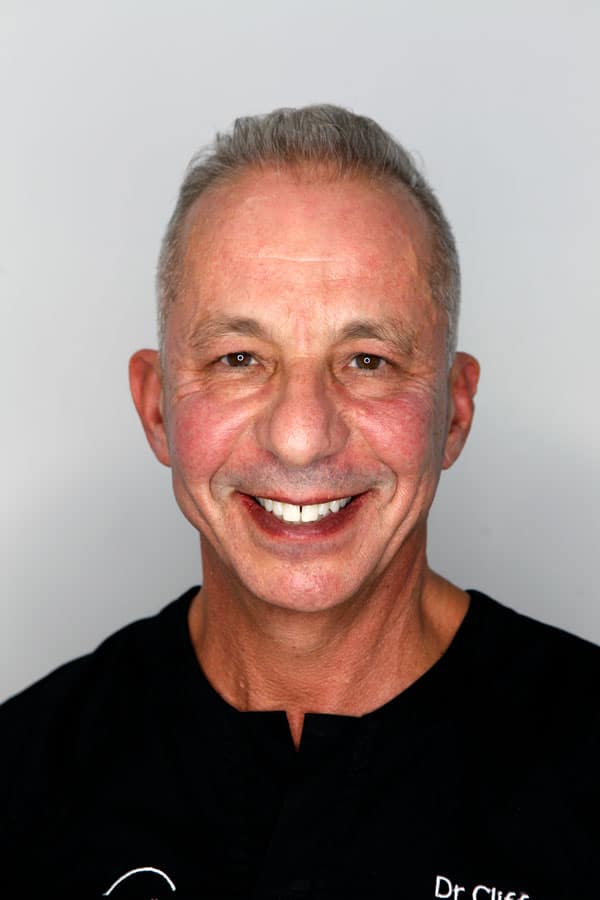Chapters
Introduction to the Podcast
[0:11 – 0:48]
Host Eon Engelbrecht welcomes listeners to “Save Your Money, Save Your Teeth,” featuring Dr Clifford Yudelman from OptiSmile. OptiSmile is consistently ranked on Google under “Best Dentists in Cape Town”, with over 320 five-star reviews. This episode will explore gum disease, combining expert dental advice with practical financial tips.
Understanding Gum Disease
[0:49 – 2:04]
Dr Yudelman explains gum disease, including gingivitis and periodontal disease, their symptoms, and the importance of early treatment. The discussion highlights how regular dental checkups can prevent severe conditions and reduce dental costs.
Role of Plaque in Gum Disease
[2:06 – 2:45]
The conversation shifts to how plaque contributes to gum disease and the essential habits needed to prevent it, like brushing and flossing. Dr Yudelman emphasises the value of regular dental cleanings.
Identifying Signs of Gum Disease
[2:46 – 3:39]
Dr.Yudelman describes additional signs of gum disease, such as bad breath, red or swollen gums, and the presence of tartar. These indicators highlight the need for professional dental assessments.
Available Treatments and Cost-Savings
[3:40 – 5:16]
This segment covers the initial and ongoing treatments for gum disease, such as professional cleaning and root planing. Dr Yudelman discusses how these procedures can prevent more costly treatments in the future.
Impact of Smoking and Diabetes on Gum Disease
[5:17 – 7:56]
Dr.Yudelman explores how smoking and diabetes exacerbate gum disease, increasing treatment costs and complicating recovery. He stresses the importance of quitting smoking and managing diabetes effectively.
Advanced Treatments for Severe Gum Disease
[7:57 – 10:00]
For advanced cases, Dr Yudelman explains the need for potentially intensive treatments, such as surgery, to manage deep periodontal pockets and prevent tooth loss.
Prevention Through Regular Checkups
[10:01 – 11:25]
The benefits of regular dental checkups are discussed, emphasising early detection and less invasive treatments, which are more cost-effective and less complex.
Recurrence of Gum Disease
[11:26 – 12:12]
Dr Yudelman addresses the likelihood of gum disease recurrence and the necessity of maintaining a rigorous oral hygiene routine and regular dental visits to manage health effectively.
Systemic Health Impacts of Gum Disease
[12:13 – 13:43]
The episode concludes with a discussion on the broader health implications of gum disease, including potential links to systemic conditions like diabetes and cardiovascular disease.
Closing Remarks
[13:44 – 15:24]
Eon thanks Dr Yudelman for his insights and reminds listeners to consult their dental professionals. The episode wraps up with an invitation to explore more dental health topics in future podcasts.
Transcript
Eon Engelbrecht E-Radio (0:11 – 0:48)
Welcome to Save Your Money, Save Your Teeth, the go-to podcast where curiosity meets dentistry straight from the experts. It’s Eon with you, and every week, I’ll be chatting with Dr Clifford Yudelman from OptiSmile as we take a deep dive into the world of dental care from a consumer’s perspective. Whether you’re looking to brighten that smile or protect your wallet, we’ve got you covered with practical advice and the latest insights.
So, stick around as we uncover the secrets to maintaining both your dental health and also your finances. Dr Yudelman, welcome back.
Dr Clifford Yudelman OptiSmile (0:49 – 0:57)
Thanks, Eon. I hope you had a great week, and thanks for having me back to talk about gum disease today.
Eon Engelbrecht E-Radio (0:57 – 1:03)
Yes, gum disease. What on earth is gum disease, and why is it so important to treat it early, doctor?
Dr Clifford Yudelman OptiSmile (1:03 – 2:04)
So, gum disease encompasses things like gingivitis and periodontal disease. These things cause inflammation, soreness, and infection of the tissues supporting the teeth, basically the gums and the bone. It’s called pink toothbrush syndrome. Basically, if you brush your teeth with no toothpaste and your toothbrush goes pink, you’ve got bleeding gums that bleed when you brush.
Or if you do, on occasion, floss your teeth, and it smells bad, or it bleeds, that’s a sign that you’ve got gingivitis or, even worse, gum disease. So, we’ll get more into that a bit later. But early treatment prevents progression to more severe forms and, potentially saving your teeth and reducing future dental costs.
And regular dental checkups can catch early signs of gum disease, allowing for less invasive and more cost-effective treatments.
Eon Engelbrecht E-Radio (2:06 – 2:11)
Doctor, how does plaque contribute to gum disease, and what can I do to prevent it?
Dr Clifford Yudelman OptiSmile (2:11 – 2:45)
Plaque is a bacterial film on teeth that’s the primary cause of gum disease. And daily brushing and flossing along with dental floss, I mean, along with interdental brushes, if you use those little brushes or, in some cases, even those little rubber toothpick-type things, is better than nothing. And that’s critical for removing plaque and preventing gum disease.
Regular dental cleanings remove tartar and plaque that the at-home care can miss and reduce the likelihood of severe gum disease.
Eon Engelbrecht E-Radio (2:46 – 2:50)
Doctor, what are some other signs that I might have gum disease?
Dr Clifford Yudelman OptiSmile (2:51 – 3:39)
Aside from pink toothbrush and bleeding gums when you brush or floss, it’s a bad breath or bad taste in your mouth, which could mean that if you’re sucking on your teeth, you could even have some pus coming up between your gum and your tooth, gets on your tongue, like we discussed in our bad breath episode around Valentine’s Day. Bleeding gums will cause your tongue and your palate to smell and give you bad breath. If your gums look very red or swollen, they may recede.
You can sometimes see black tartar at or just below the gum line. These are all signs that you need to see a dentist and get the gum disease diagnosed before it gets worse.
Eon Engelbrecht E-Radio (3:40 – 3:46)
What treatments are available for gum disease, and how can they save you money in the long run?
Dr Clifford Yudelman OptiSmile (3:47 – 5:16)
Initial treatments include a professional cleaning and something called a root planing to remove plaque and bacteria. If you’ve got tartar under the gum or calculus under the gum, that needs to be removed. If it’s sensitive, the dentist or hygienist needs to numb you to get under the gum or use a very fine ultrasonic machine and gently clean under the gum.
If you go to a dentist, you’ve got bleeding gums, and they only spend 5-10 minutes cleaning your teeth. Maybe it is one of those clinics or medical aid practices that we spoke about. It could even be a private practice, but if you’re going into a fancy practice and they’re spending an hour. They’re charging you R900 or R1000 or whatever to do a cleaning, they generally are going to be very cautious and go under the gum and do everything they’re supposed to. If that’s not the type of cleaning you’ve had and you can see black stuff under your gum and your gums are swollen, then you need a proper cleaning, consistent follow up and maintenance cleanings afterwards to prevent the progress of this, which can reduce the need for more expensive surgery or even tooth replacement later on.
And implementing a thorough daily oral hygiene routine after treatment can prevent the recurrence and additional expenses.
Eon Engelbrecht E-Radio (5:17 – 5:23)
Doctor, how does smoking affect one’s risk of gum disease and also its treatment costs?
Dr Clifford Yudelman OptiSmile (5:23 – 7:56)
So, smoking and diabetes are two very bad things for gum disease. The smoking increases gum disease by increasing plaque production and it reduces oxygen in the bloodstream and it hinders gum healing. Smokers are more likely to have severe gum disease, leading to higher treatment costs and more frequent dental visits.
And quitting smoking can significantly reduce the progression of gum disease and associated health and dental costs. I’ll often see people who are heavy smokers, and we look at them and their gums look perfectly healthy. And then we take an x-ray and there’s a lot of bone missing under the gum line and it’s quite a shock.
And I immediately say to them, how long have you been smoking? I don’t even ask them, are you a smoker? And the same thing goes with diabetes.
Some patients have got, usually it’s someone with a type 2 diabetes, they’re overweight, they’ve got insulin resistance and they’re not controlling their blood sugar. And this is a bad risk factor for gum disease as well. And if you’re a smoker and you’re overweight, then you’re really looking for trouble.
You should listen to our podcast about how these types of things will affect your general health long-term. Doctor, what should I do if I think I have gum disease? So go and see the dentist, have a thorough checkup.
It’s no good just going to a hygienist every six months. The dentist should check your teeth. Some hygienists are very good at advising you and doing something called a periodontal probing, but a lot of hygienists don’t have that experience or they’re just cleaning the plaque and tart above the teeth and they’re in a big hurry because it is a lower cost practice and they only give them 10 minutes to clean the teeth.
Possibly taking x-rays to assess any bone loss, a good panoramic x-ray that takes in all of your teeth will show any hidden problems, and an early professional assessment allows for timely treatment, potentially saving your teeth and money on more complex procedures and follow-through with recommended treatments and home care instructions to prevent further deterioration.
Eon Engelbrecht E-Radio (7:56 – 8:02)
And what additional treatments might be necessary if I have advanced gum disease?
Dr Clifford Yudelman OptiSmile (8:02 – 10:00)
So, when we measure the gums with a little blunt probe, it’s like a small ruler or dipstick. If you’ve got one, two, or three millimetres where it slips under the gum, and your gum is firm and pink, looks like an orange peel, and doesn’t bleed, that’s healthy gum. When you start getting into the four, five, and six-millimeter pockets, that will respond.
A periodontal pocket is the space between the gum and the tooth. That should be zero, one or two or three millimeters maximum with no bleeding, like I just said. But if you’ve got a four or five millimeter pocket in a few areas and you get bleeding, some root planning and good oral hygiene, maybe a chlorhexidine toothpaste or mouthwash short-term, in some cases antibiotics if the dentist uses those for treatment and the gums become nice and firm, that’s a good way to go.
But in some cases, if you’ve got a six, seven, or eight-millimetre pocket, you may need surgery to do bone regeneration or to actually pull back the gum, clean all the way at six, seven, eight millimetres down under the gum, and stitch the gum’s back. That’s gum surgery. And then, usually, you’ve got to go every three months. Going every six months or every four months is not good enough.
These treatments, while initially more costly, can prevent the need for tooth extraction and replacements like implants. If you’ve had that type of treatment and you’re listening and you’re a smoker or you’re diabetic and you’ve gone through all of that and you haven’t had a cleaning in the last three months, well then don’t waste your money and your time on the initial treatment that will really, it will come back very quickly. You need to go in, go see your dentist, your periodontist, your hygienist as soon as possible.
Eon Engelbrecht E-Radio (10:00 – 10:06)
Doctor, how can regular dental checkups actually help prevent gum disease from worsening?
Dr Clifford Yudelman OptiSmile (10:07 – 11:25)
Yeah, so I mean, getting it, catching it early when it’s most treatable is less costly to manage. Professional cleanings to remove calculus and plaque buildup that your everyday brushing and flossing might miss. If your gums are firm and pink and there’s a bit of tart above the gum, the hygienist or dentist can just flick that off with a scaler or a special machine and give you a polish and just brush up on your brushing techniques or your flossing and it’s pretty straightforward.
We even have patients with fantastic oral hygiene and gums that only need to come for a clean every year and in some cases, even every year and a half. I don’t even need to check their teeth every time. I mean, that’s ideal.
Dentists can provide personalized advice on improving your home care routine and directly impact the health of your gums and the longevity of your teeth. And there’s some very, very good, highly trained oral hygienists, mainly in the higher-end practices that can afford to employ these great hygienists. And they’re as good as dentists in many, many cases.
Unfortunately, not always. So, I hope nobody gets upset with me, but I’m here for the consumer, like I’ve said before.
Eon Engelbrecht E-Radio (11:26 – 11:32)
And can you get gum disease again after treatment and how would you prevent it?
Dr Clifford Yudelman OptiSmile (11:32 – 12:12)
Yeah. So, I mean, just as I was saying, you need ongoing management. You’ve got to go every three months.
That’s a standard all around the world. And if you’re very, very good with your oral hygiene, they might upgrade you to four months or six months. But as soon as you have any bleeding or any problems, it’s back to three months and it’s back to three months and getting a good cleaning, getting periodontal probing.
All of these things are important to prevent gum disease coming back again. If you smoke, you’ve got to give up smoking. If you’re diabetic, you need to make sure you’re controlling your blood sugar really, really well.
Eon Engelbrecht E-Radio (12:13 – 12:21)
Okay. And finally, doctor, is there a link between gum disease and other health issues? And also, how does this affect the treatment costs?
Dr Clifford Yudelman OptiSmile (12:21 – 13:43)
So, research shows the correlation between gum disease and systemic conditions like diabetes, heart disease and strokes. We spoke about that in an earlier podcast. It can lead to, if you’re a woman who’s pregnant and you’ve got really bad gums, it can lead to preterm birth, meaning much higher expenses.
The baby might have to stay in hospital. If it’s very premature, there’s a mechanism where gum disease will cause babies to be born early and often, they’ll be low weight and it will create a lot of financial burden on the family and on the healthcare system. And managing your gum health may contribute to better overall health and potentially lowering all your healthcare costs.
Having bad gum disease and smoking can help to cause diabetes. There’s a sort of double link there and taking a proactive approach to oral health can definitely reduce both your dental and medical treatment expenses over time. So, I think it was a great podcast today and hopefully it helps a lot of people prevent this terrible problem that causes many people to have loose teeth and lose their teeth eventually.
Eon Engelbrecht E-Radio (13:44 – 13:50)
A big thank you to you, Dr Clifford Yudelman, for sharing your expertise with us today. We really appreciate it.
Dr Clifford Yudelman OptiSmile (13:50 – 13:53)
Thank you very much and I’ll chat to you next week.
Eon Engelbrecht E-Radio (13:53 – 15:24)
Absolutely. And that’s another episode of Save Your Money, Save Your Teeth. And remember, while we strive to provide valuable insights, you must always consult with your own dental professional for advice tailored to your personal health.
Also, don’t forget to subscribe for more enlightening discussions and then join us again next week as we continue to explore the fascinating intersection of dental health and financial savvy. Until then, keep smiling and taking great care of your teeth. Discover the world of dental excellence with OptiSmile.
Join us for a weekly podcast featuring Dr Clifford Yudelman, a seasoned expert with 40 years of dental experience across four continents. Gain unique insights and expert dental advice by visiting optismile.co.za for articles that illuminate the path to optimal oral health. If you’re seeking unparalleled dental care in Cape Town, get in touch with OptiSmile or book directly online on optismile.co.za. OptiSmile, where global expertise meets local care.
Disclaimer: The content provided in this podcast, “Save Your Money Save Your Teeth” on Medical Mondays, is for informational and educational purposes only. It is not intended to serve as dental or medical advice. The insights and opinions expressed by Dr. Clifford Yudelman and any guests are designed to foster a better understanding of dental health, preventive measures, and general well-being, but should not be interpreted as professional dental or medical recommendations.Dr. Clifford Yudelman does not diagnose, treat, or offer prevention strategies for any health conditions directly through this podcast. This platform is not a substitute for the personalized care and advice provided by a licensed dental or healthcare professional. We strongly encourage our listeners to consult with their own dental care providers to address individual dental health needs and concerns.The information shared here aims to empower listeners with knowledge about dental health but must not be used as a basis for making health-related decisions without professional guidance. Your dental care provider is the best source of advice about your dental and overall health. Please always seek the advice of your dentist or other qualified health professionals regarding any questions or concerns about your dental health.





